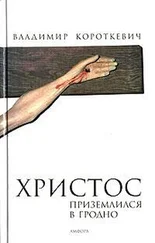And, evidently, because she was on the first floor and did not consider it necessary to stand on ceremony with me, she began to speak with that expressive intonation of the common folk. “And teal and poppy you don't want? Just see what he needs! And he has hidden the paper. May your children grab your bread from you in your old age as you have grabbed this paper from me. Perhaps I have more right to be here than you. But he, just look, sits there, asking, asking. Damn him!”
This had become boring, and I said: “What is it you want? Prison? Why are you here? Or perhaps it's from here you send signals to the Wild Hunt?”
The housekeeper was offended. Wrinkles gathered on her face.
“Sinful, sir!” she quietly muttered. “I'm an honest woman, I've come here to get what's mine. There it is, in your hand. It belongs to me.” I looked at the piece of paper. It was an extract from a resolution passed by a smallholder claims committee:
“And although the above-mentioned Zakreŭski declares to this very day that he and not Haraburda is heir to the Janoŭskis, this case which has lasted over a period of 20 years, is now closed, as not having been proven, and Mr. Isidore Zarkevsky is deprived of his rights to aristocratic rank for the lack of proof.”
“So what?” I asked.
“This is what, my dear fellow,” the housekeeper came back bitingly, “I am Zakreŭskaja, that's what. And it was my father who went to court with the great and the powerful. I didn't know about it, but my thanks to some good people. They told me what to do. The district judge took ten little red ones, but he gave me good advice. Give me that paper.”
“It won't help you,” I said. “It isn't really a document. Here the court refuses your father his request, even his right to the gentry is not established. I know about this examination of the petty gentry very well. If your father had had papers to prove his right for substitution after the Janoŭskis — that would be another matter. But he did not hand in any papers — and that means that he did not have them.”
The housekeeper's face reflected a piteous attempt to understand these complicated things.
Then, not believing me, she asked:
“But perhaps the Janoŭskis bribed them? These people who raise trifling objections, just you give them some money! I know. They took the papers away from my father and hid them here.”
“And can you sue them 20 years running?” I asked. “Twenty more years?”
“My dear fellow, by that time I'll have gone to wash God's portals for him.”
“Well, so you see. And you have no papers. You have searched everything here, haven't you?”
“Everything, young man, everything. But it's a shame to lose what's mine.”
“But they are all only vague rumours.”
“But the money — those red ones and the blue ones — mine.”
“And it is very bad to rummage nights among papers not belonging to you.”
“My dear fellow, the money is mine,” she drawled dully.
“The court will not grant you it, even if there were any papers to prove it. This entailed estate has belonged to the Janoŭskis over a period of 300 years or even longer.”
“But it's mine, my dear fellow,” almost in tears, and the greed on her face was loathsome to see. “I would have stuffed them, the dear ones, here, right here in my stockings. I would have eaten money, slept on money.”
“There aren't any papers,” losing all patience. “There is a lawful heir.”
And at this moment something awful occurred. The old woman stretched her neck, — it became a long-long one — and with her face close to mine, hissed:
“So perhaps... perhaps... she will die soon.”
Her face even brightened at this hope.
“She will die, and that's all. She's weak, sleeps badly, almost no blood in her veins, coughs. It won't cost her anything to die. The curse will be fulfilled. Why must Haraburda get this castle when I could live in it? It won't make any difference to her, her sufferings will be over — and off with her to the holy spirits. While I here would...”
The expression on my face probably changed, for I was furious. She suddenly pulled her head into her shoulders.
“You crow! Come flying to carrion? But it's not carrion here, it's a living person. And such a person who is worth dozens of you, who has a greater right than you to live on this earth, you foolish, empty thing.”
“My dear fellow...” she whined.
“Shut up, you witch! And you wish to send her to her grave? You are all alike here, vipers! You are all ready to murder a person for the sake of money. All of you — spiders. For the sake of those blue little papers. And do you know what life is, that it is so easy for you to speak of another person's death? I wouldn't scatter pearls at your feet, but listen to me, you want her to exchange the sunlight, joy, good people, the long life awaiting her, for the worms in the earth? Is that what you want? So that you can sleep on money? The money that the Wild Hunt is seeking here? Maybe it's you who lets the Lady-in-Blue in? Why did you open the window in the corridor yesterday?”
“Oh, my God! I didn't open it! It was so cold then. I was even surprised at its being open.” She was almost wailing.
Her face expressed such fear that I could no longer keep silent. I lost all prudence.
“You want her death! You evil dog, you crow! Get out! She's a noble lady, your mistress. Perhaps she'll not drive you out, but I promise you, that if you do not leave this house that your stinking breath has polluted, I'll have all of you put in prison.”
She went over to the staircase crying bitterly. I followed after her. We went upstairs to the room where that closet was, and I stopped in surprise. Janoŭskaja in a white dress with a candle in her hand was standing before us. Her face was sad, and she looked at the housekeeper with disgust.
“Mr. Biełarecki, I heard your talk accidentally, heard it from the very beginning. I had followed in your footsteps. At last I've learned the meaning of low-down actions and the depth of one's conscience. And you...” she turned to Zakreŭskaja, standing aside with head lowered, “you can remain here. I forgive you. With difficulty, but I forgive you. And you, Biełarecki, forgive her. Stupid people should sometimes be forgiven. Because... Where will she go from here? Nobody needs her, a foolish old woman.”
A tear rolled down from her eyelashes. She turned round and left. I went after her. Janoŭskaja stopped at the end of the corridor and said quietly:
“For the sake of these papers people cripple their souls. If my ancestors hadn't forbidden it, how gladly I should have given this mouldy old house to somebody. This house, and also my name, are a torture for me. If only I could die soon. Then I'd leave it to this woman with a heart of stone and a stupid head. Let her be happy if she is able to creep on her belly for the sake of this junk.”
In silence we went down into the room on the lower floor and over to the fireplace. We stood there looking at the fire, and its crimson reflections fell on Janoŭskaja's face. In the last few days she had changed noticeably, perhaps she had grown up, perhaps she was simply coming into womanhood. I hope no one besides myself had noticed this. I was the only one to see that life was warming up as yet unotice-ably in this pale sprout growing underground. Her look had become more meaningful and inquisitive, although a chronic fear lay on her face like a mask as formerly. She had become a little livelier. For some reason the pale sprout had come to life.
“It's good to stand like this, Miss Nadzieja,” I said pensively. “A fire burning...”
“A fire... It's good when it is made, when it burns. It is good when people don't lie.”
Читать дальше



